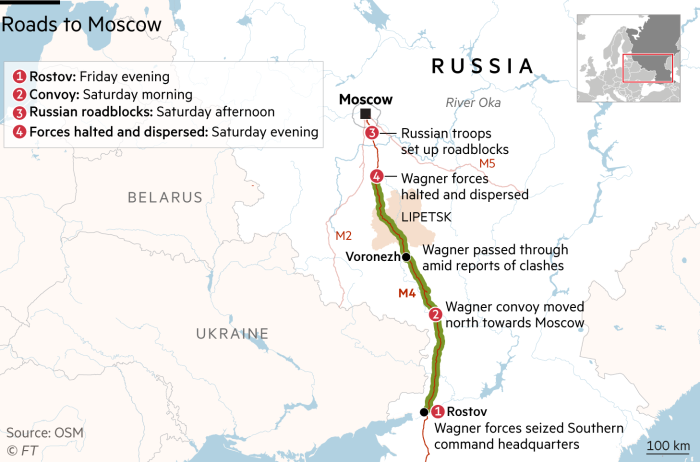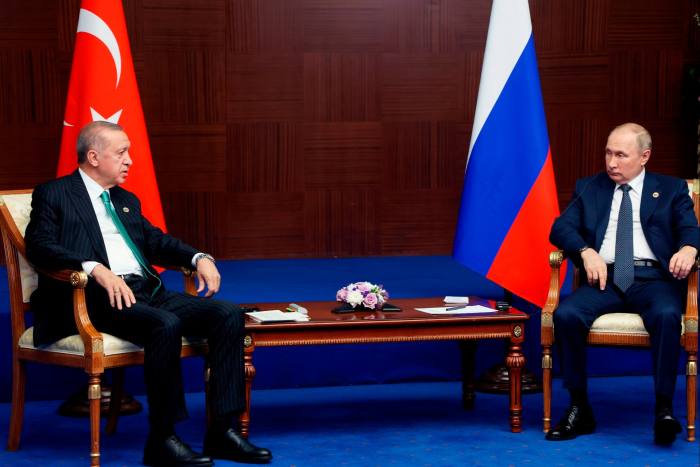This article is an onsite version of our Europe Express newsletter. Sign up here to get the newsletter sent straight to your inbox every weekday and Saturday morning
Welcome back. Western government analysts, independent experts and media commentators have been pressed all week to predict what will happen in Russia after Yevgeny Prigozhin’s aborted mutiny. But the truth is, we don’t know — a point that struck me when I remembered a joke I was told in Moscow in the 1980s during the final years of the Soviet Union. I’m at [email protected].
According to this joke, one Russian asks another: “What’s coming?” The reply: “I know what’s coming, but I don’t know what will happen before it comes.”
Placed in today’s context, the joke captures the truism that Vladimir Putin’s reign will end one day. What we cannot know — and what is more relevant for western policymakers — is the course that events will take before that happens.
From the publicly available commentaries on Russia that I’ve sampled this week, I’d like to pick out five themes. These are: what Prigozhin’s uprising tells us about the strengths and weaknesses of Putin’s system of rule; the risk of the disintegration of the Russian state; the impact on the war in Ukraine; the outlook for Russian-Chinese relations; and the role of Belarus.
Putin’s weaknesses
The consensus view is that Prigozhin’s mutiny exposed grave vulnerabilities in Putin’s highly personalised style of rule. Max Seddon, the FT’s Moscow bureau chief, quoted a Russian oligarch who has known the president since the 1990s:
It’s a huge humiliation for Putin, of course . . . Thousands of people without any resistance are going from Rostov almost to Moscow, and nobody can do anything.

In an article for the Washington-based Center for European Policy Analysis, Irina Borogan and Andrei Soldatov amplify this thought:
Prigozhin’s raid on Rostov-on-Don was so outrageous and brazen that it reminded the Russians of the 1990s and early 2000s, when Chechen militants walked into hospitals, towns and schools, taking everyone hostage and demanding the Kremlin stop the war in exchange for civilians’ lives.
Several commentators made the point that, for the first time in Putin’s 23-year rule, Russians got a glimpse of a future without him. Sam Greene, professor of Russian politics at King’s College London, tweeted:
The greatest threat to Putin at this point comes not from Prigozhin, but from the potential that these events break the hermetic seal on the public consensus that there is no alternative to Putin.
Andrei Kolesnikov of the Carnegie Russia Eurasia Center wrote in the New York Times:
Prigozhin showed Russians a fleeting glimpse of an alternative future and, by doing so, gave Russians more reason to doubt their leadership. Is Putin really the all-powerful, czarlike figure they thought he was?
Putin’s strengths
However, this is not the whole picture. Some wise heads caution that Putin is by no means finished — not yet, at least.
My colleague Dan Dombey, a former FT bureau chief in Turkey, reminded me this week that President Recep Tayyip Erdoğan not only survived a coup attempt in 2016 but struck back ferociously at adversaries real and imagined — and he’s still in charge today. Putin, it seems, is already striking back.

For these reasons, I recommend this interview in Foreign Affairs magazine with Stephen Kotkin, an eminent historian of the Soviet Union. He says:
I have long been calling the Putin regime “hollow yet still strong”. It remained, and remains, viable as long as there is no political alternative.
However, echoing the observations of Greene and Kolesnikov, Kotkin adds:
Now, we might see just how hollow the regime is. Putin has unwittingly launched a stress test of his own regime. He had already lost his mystique with the bungling of the aggression against Ukraine. Mystique, once lost, is near impossible to regain.
Will Russia disintegrate?
As I wrote in this newsletter exactly one year ago, Putin’s misfiring war in Ukraine has excited much speculation, particularly among conservatives in the US and central and eastern Europe, that Russia may break up under the strain.
Prigozhin’s mutiny has breathed fresh life into this line of thinking. Here is Ana Palacio, a former Spanish foreign minister, writing for Social Europe:
Putin could be driven from power, leaving behind a fragmented Russia where various “warlords” compete for power — including control of the world’s largest nuclear arsenal.
Palacio’s article emphasises the dangers of a Russian break-up. But in this commentary, Jean-Dominique Giuliani, chair of the Brussels-based Robert Schuman Foundation, suggests there may be an upside:
The end of the Russian Federation would simply be the culmination of a long process of decolonisation that began in 1991, the real end of the tsarist era prolonged by the communist dictatorship, which survived only by conquest.
Personally, I think Giulani overstates the possibility that autonomous regions such as Buryatia, Dagestan, Tatarstan and Tuva could build viable independent states next to a truncated Russia, likely to be full of grievance-filled nationalists and more moderate but shocked citizens.
Still, it was revealing that Putin’s denunciations of Prigozhin used the word smuta, an allusion to the Time of Troubles of the early 17th century, when the Russian state broke down under the pressure of competing factions in Moscow and foreign war.
Putin may have been playing on ordinary Russians’ fear of violent disorder. But to me his language sounded full of authentic rage at the prospect, however remote, of the state’s collapse.
Security guarantees for Ukraine
Is the Russian turmoil good or bad for Ukraine? The much-heralded Ukrainian counter-offensive has not yet delivered breakthroughs on the scale that President Volodymyr Zelenskyy and his military commanders hoped for.
But commentators such as Mikhail Komin contend that Prigozhin’s revolt exposed “the scale of the crisis within the Russian armed forces, which are disillusioned by constant failures and tired of war”.
It might therefore be the right time for the US and its allies to double down on their military and financial support for Ukraine. Judy Dempsey of Carnegie Europe goes further and says western governments should extend security guarantees to Kyiv at the forthcoming Nato summit in Lithuania.
However, the US — which is the key decision maker — is wary of going too far too soon.
China and Russia: limits to the “no limits” friendship?
How China views Prigozhin’s mutiny and Putin’s response is worth an entire newsletter in itself. A good, succinct analysis appeared in this Twitter thread from Joseph Torigian of the American University in Washington. He says:
The Chinese likely believe that Putin is still the best chance for stability in Russia and see supporting him as one of the core foundations of the relationship. Some Chinese commentators have noted that Putin did emerge victorious quickly and with little blood spilt.
On the other hand, Beijing may take the view that Putin and his entourage really need to get their house in order. A small number of Chinese scholars have sounded doubtful about where the supposed “no limits” friendship with Russia is taking their country, with one suggesting that Beijing must take care not to get dragged by the Kremlin into a quagmire of war.
I would add that China’s perception of the US as its chief long-term international rival means that Beijing has a strong interest in keeping Russia on its side.
Lukashenko: ‘For 30 minutes, we talked obscenities’
And so to Belarus, whose dictator, Alexander Lukashenko (profiled here in the FT), played a part in defusing the showdown between Putin and Prigozhin.
On Monday the Economist magazine published a commentary under the headline: “Alexander Lukashenko is the clearest beneficiary of Wagner’s munity.”
I have to say that I think this is totally wrong, and to be fair the article did quote a Ukrainian official as saying that Lukashenko’s role had been much exaggerated:
“He was told to become an intermediary, and he stepped in line.”
However, why not read what Lukashenko said about it all? This transcript, provided by the Meduza news website, will be an item for historians down the ages.
Lukashenko said that, whereas Putin told him he couldn’t get hold of Prigozhin when the mercenary chief was in Rostov, he himself successfully contacted the rebel less than an hour later.
“For the first 30 minutes, we talked only in obscenities,” Lukashenko said — well, that bit certainly rings true.
“We’re going to march on Moscow!” he quoted Prigozhin as saying. Then: “I said to him, ‘They’ll squash you like a bug.’”
And so the dictator calmed down Prigozhin and covered himself in glory — or not. For a more sober view, read Thomas Graham, a distinguished former US diplomat in Moscow, in the New York Times:
The fact is that Lukashenko is not an independent actor but a tool of Kremlin policy, and he has been for years.
What Prigozhin’s half-baked “coup” could mean for Putin’s rule — an interview in the New Yorker with Tatiana Stanovaya, founder and head of R. Politik, a political analysis firm
Tony’s picks of the week
Recommended newsletters for you
Are you enjoying Europe Express? Sign up here to have it delivered straight to your inbox every workday at 7am CET and on Saturdays at noon CET. Do tell us what you think, we love to hear from you: [email protected]. Keep up with the latest European stories @FT Europe
Stay connected with us on social media platform for instant update click here to join our Twitter, & Facebook
We are now on Telegram. Click here to join our channel (@TechiUpdate) and stay updated with the latest Technology headlines.
For all the latest Business News Click Here
For the latest news and updates, follow us on Google News.
